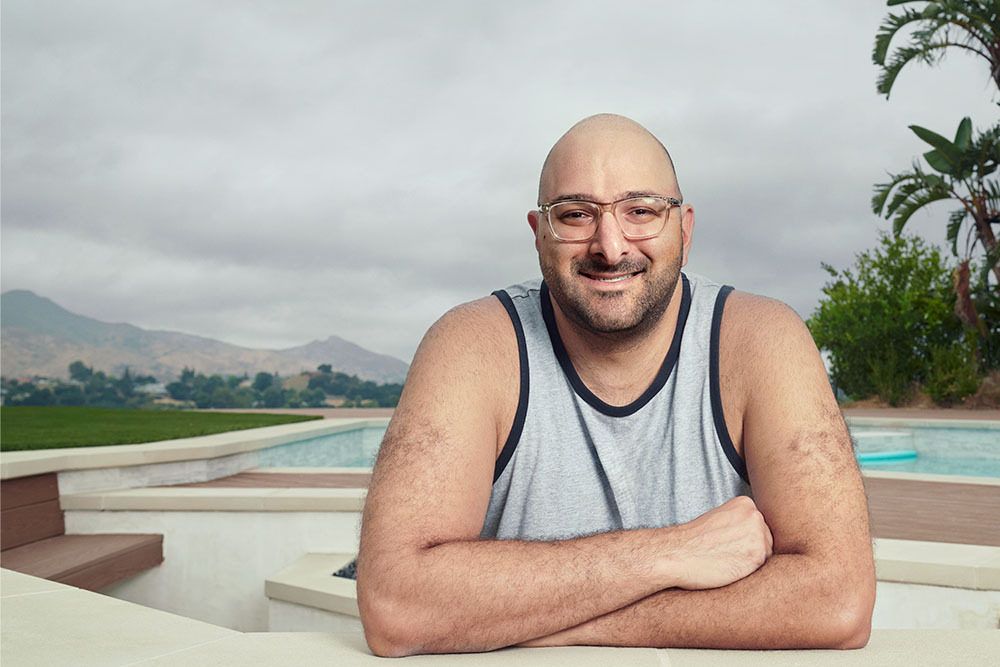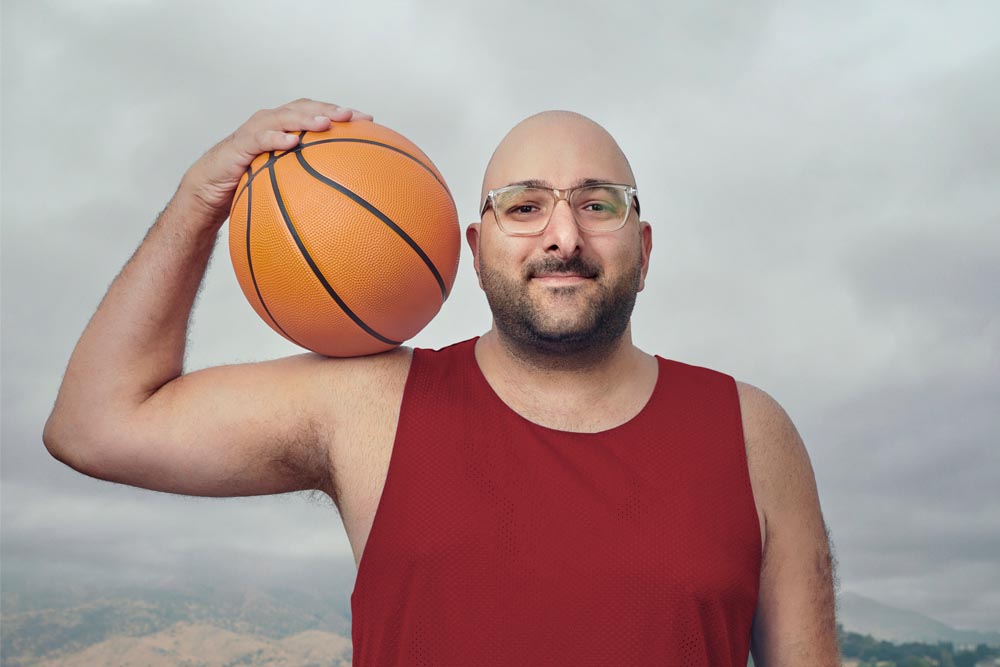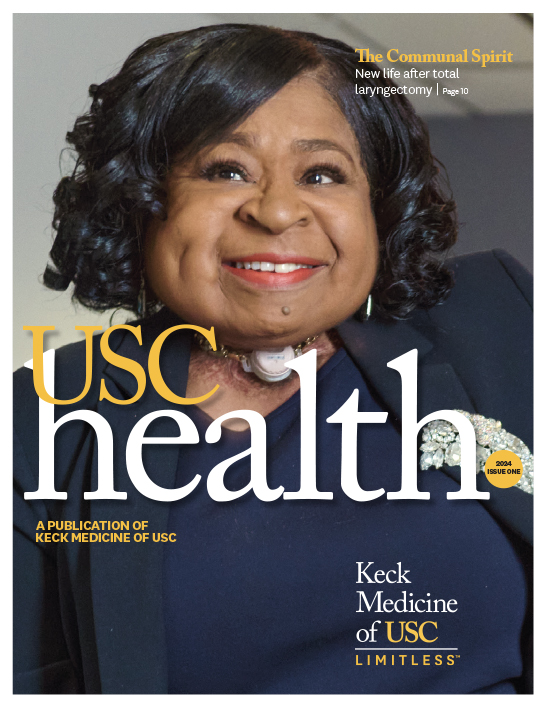
After a testicular cancer diagnosis, Cameron Khani was able to avoid chemotherapy and radiation — thanks to an innovative approach by a Keck Medicine of USC specialist who treated him.
Cameron Khani always wanted to be a father.
So when he was diagnosed with testicular cancer at the age of 31, the thought of losing that dream was a top concern about his future. He and his fiancé were planning a wedding, and they wanted to have children one day.
The standard testicular cancer treatment of chemotherapy or radiation carries the risk of long-term side effects such as kidney damage — as well as increased odds of cardiovascular disease and secondary cancers.
“I felt devastated by the news I had cancer, but one of my biggest fears was the potential for infertility,” Cameron says.
A clinical trial and innovative care from Keck Medicine of USC helped Cameron avoid those risks, pursue an active life and grow his family.
Diagnosis of early metastatic testicular cancer
Cameron’s first sign of trouble came without warning.
“I was doing a self-exam in the shower, and I noticed that one testicle was quite literally twice the size of the other,” he says.
He went to urgent care, where a doctor examined him and suspected testicular cancer. A scan the following day confirmed the diagnosis.
After having surgery to remove his left testicle, Cameron received another scan that revealed the cancer had spread to his lymph nodes. He consulted more than a dozen doctors about what to do next.
Several experts recommended Sia Daneshmand, MD, director of urologic oncology for USC Urology, part of Keck Medicine, and the Keck School of Medicine of USC’s Catherine and Joseph Aresty Department of Urology.
At the time, Dr. Daneshmand was in the early stages of a clinical trial that could revolutionize treatment for early metastatic seminoma, one of the two common forms of testicular cancer.
Chemo-free surgical intervention for stage 2 testicular cancer
Surgery to remove cancerous lymph nodes from behind the abdomen is an established treatment for metastatic nonseminoma — the other form of testicular cancer, which can grow faster than seminomas — but it is traditionally performed when chemotherapy fails to eradicate all affected lymph nodes.
Dr. Daneshmand had explored treating early-stage metastatic seminoma patients with surgery alone about a decade ago.
“The first four patients I treated were successfully cured with surgery alone,” says Dr. Daneshmand, who is also a member of USC Norris Comprehensive Cancer Center. “But I knew to move the needle, we would need a prospective, multi-institutional clinical trial.”
This is a highly successful treatment option that can help patients avoid the systemic toxicities of chemotherapy and radiation therapy.
Sia Daneshmand, MD, director of urologic oncology for USC Urology
The positive results led to a larger clinical trial across several institutions — including Keck Medicine — targeting patients with stage 2 testicular cancer.
Cameron was among the first participants to sign up.
“I was a bit of a pioneer, and I had to take a leap of faith,” Cameron says. “But I really had 100% full confidence in Dr. Daneshmand. The reward was well worth the risk I was taking.”
High success rate for testicular cancer abdominal surgery
The surgery, which involved a 10-centimeter incision along the middle of the abdomen, took place at Keck Hospital of USC.
“The care there is top-notch, and the teams treat you like you’re at a five-star hotel,” Cameron says. “It was the fastest recovery ever. I was back to work in less than three weeks.”
Eight years later, he remains cancer-free.
Cameron and most trial participants — 8 in 10 — were cured without needing further therapy.
Fifty-five people in the United States and Canada took part in the trial, including 15 who received surgery at Keck Hospital.
The remainder of patients were successfully cured with chemotherapy or additional procedures, for a 100% total survival rate. Most cancer recurrences happened within two years of surgery.
“For the majority of patients to be cured with a single surgery was certainly a big win,” says Dr. Daneshmand, who served as the trial’s lead investigator.
Another big win is the recovery time.
Most patients can go home the day after surgery, with orders to rest and avoid heavy lifting for a short period.
“This is a highly successful treatment option that can help patients avoid the systemic toxicities of chemotherapy and radiation therapy,” Dr. Daneshmand says. “I imagine it will become part of the national and international treatment guidelines very soon.”

Conceiving a child after testicular cancer treatment
Cameron, now 39, returns to Keck Medicine each year for a CT scan. At the 10-year mark of his surgery, he will no longer require routine surveillance scans.
“It’s extremely rare for cancer like this to come back anywhere in the body after that many years,” Dr. Daneshmand says. “Cameron has a fantastic prognosis and is leading a completely normal life.”
Cameron, who lives in Agoura Hills and works as a technology recruiter, continues to be inspired by his care journey.
And, this summer, he and his now-wife Emily received incredible news: The couple is expecting their first child.
“I was driving on the 101 when I found out, and I just yelled at the top of my lungs,” Cameron says. “In the years since I’ve had the surgery, I can’t tell you how many blessings I’ve had.
“It gave me the opportunity to be able to start a family — and a new perspective on life.”
Topics


